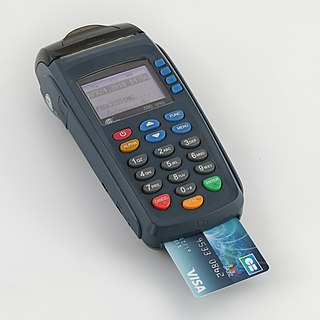 W
WA card enclosure is a container for smart cards, credit cards, debit cards, telephone cards, visiting cards, business cards and other cards of similar size. Most cards have dimensions that follow the ID-1 format of the ISO/IEC 7810 standard which specify the physical dimensions for cards to be 85.60 × 53.98 mm. The enclosures can be made of metal, leather, or plastic and come in various colors and designs. Sometimes having a laser engraved design for aesthetic purposes.
 W
WA credit card balance transfer is the transfer of the outstanding debt in a credit card account to an account held at another credit card company.
 W
WA credit card imprinter, colloquially known as a ZipZap machine or Knuckle Buster, is a manual device used by merchants to record credit card transactions before the advent of payment terminals.
 W
WCredit card interest is a way in which credit card issuers generate revenue. A card issuer is a bank or credit union that gives a consumer a card or account number that can be used with various payees to make payments and borrow money from the bank simultaneously. The bank pays the payee and then charges the cardholder interest over the time the money remains borrowed. Banks suffer losses when cardholders do not pay back the borrowed money as agreed. As a result, optimal calculation of interest based on any information they have about the cardholder's credit risk is key to a card issuer's profitability. Before determining what interest rate to offer, banks typically check national, and international, credit bureau reports to identify the borrowing history of the card holder applicant with other banks and conduct detailed interviews and documentation of the applicant's finances.
 W
WDynamic currency conversion (DCC) or cardholder preferred currency (CPC) is a process whereby the amount of a credit card transaction is converted at the point of sale, ATM or internet to the currency of the card's country of issue. DCC is generally provided by third party operators in association with the merchant, and not by a card issuer, such as Visa or Mastercard. Card issuers permit DCC operators to offer DCC in accordance with the card issuers’ processing rules. However, using DCC, the customer is usually charged an amount in excess of the transaction amount converted at the normal exchange rate, though this may not be obviously disclosed to the customer at the time. The merchant, the merchant's bank or ATM operator usually impose a markup on the transaction, in addition to the exchange rate that would normally apply, sometimes by as much as 18%.
 W
WInterchange fee is a term used in the payment card industry to describe a fee paid between banks for the acceptance of card-based transactions. Usually for sales/services transactions it is a fee that a merchant's bank pays a customer's bank ; and for cash transactions the interchange fee is paid from the issuer to acquirer, often called reverse interchange.
 W
WA payment terminal, also known as a point of sale (POS) terminal, credit card terminal, EFTPOS terminal, is a device which interfaces with payment cards to make electronic funds transfers. The terminal typically consists of a secure keypad for entering PIN, a screen, a means of capturing information from payments cards and a network connection to access the payment network for authorization.